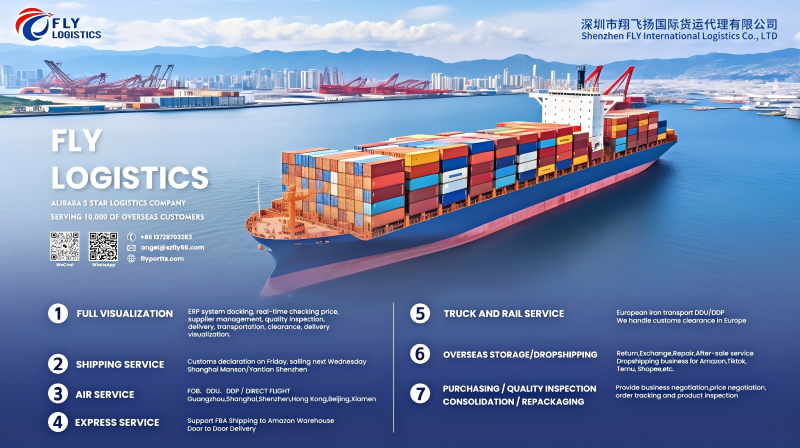TikTok, one of the most popular social media platforms globally, has transformed the digital landscape, particularly in e-commerce and international logistics. Its short-form video content has captured the attention of millions worldwide, making it a powerful tool for cross-border e-commerce businesses to reach international customers. However, recent discussions and potential actions regarding TikTok’s suspension in the United States have raised concerns among e-commerce businesses, logistics companies, and consumers. This article explores the impact of TikTok’s suspension on cross-border e-commerce and international logistics and offers potential solutions to mitigate the effects.
TikTok’s Role in Cross-Border E-Commerce
TikTok has become a significant player in global e-commerce, particularly for small and medium-sized businesses (SMBs) looking to expand their reach. By using TikTok’s massive audience, businesses have been able to market products creatively and engage with consumers directly. The platform’s viral nature allows content to spread quickly, driving traffic to online stores and generating substantial sales. TikTok’s short videos and influencer partnerships have helped brands tap into new markets, particularly in regions where traditional advertising channels might be less effective.
Many e-commerce platforms have integrated TikTok as part of their marketing strategy, driving traffic to their online stores and boosting brand recognition. The “TikTok Made Me Buy It” trend is a prime example, where products featured on TikTok videos see a significant surge in sales. Additionally, TikTok has also launched shopping features, such as TikTok Shop, enabling users to purchase directly through the app, streamlining the purchasing process, and enhancing the customer experience.
Potential Impact of TikTok’s Suspension in the US
Should TikTok face suspension in the United States, the immediate effects on cross-border e-commerce could be substantial. With the US being one of TikTok’s largest markets, a ban would disrupt the entire e-commerce ecosystem that has developed around the platform. The key impacts include:
- Loss of Marketing Channel: E-commerce businesses that heavily rely on TikTok as a marketing platform would face a significant reduction in their ability to reach potential customers in the US market. This loss could lead to a decline in sales, especially for businesses that have built their brands through TikTok content.
- Reduced Brand Visibility: For companies engaged in cross-border e-commerce, TikTok provides a unique avenue to enhance visibility and connect with US-based consumers. A suspension would limit access to this highly engaged audience, causing a drop in organic engagement and reducing brand awareness.
- Impact on Influencer Marketing: Influencer marketing, a core component of TikTok’s e-commerce ecosystem, could be severely affected. Many brands partner with TikTok influencers to create viral campaigns and drive sales. If TikTok is banned, influencers would be forced to shift to other platforms, potentially reducing their reach and impact.
- Supply Chain Disruptions: For e-commerce businesses that rely on US consumers for a significant portion of their sales, a sudden drop in demand could lead to overstocking, inefficient inventory management, and potential cash flow issues. This could disrupt the entire supply chain, from manufacturers to logistics providers, especially for businesses dealing with international shipments.

Consequences for International Logistics
The suspension of TikTok would also have ripple effects on the international logistics sector. Many logistics companies, particularly those engaged in cross-border trade, depend on the flow of goods driven by e-commerce demand. A decline in sales from TikTok-related traffic could result in:
- Reduced Freight Demand: A drop in e-commerce sales in the US could lead to reduced demand for international shipments. This would affect both sea and air freight services, with companies potentially scaling back operations or facing delays due to the shift in demand patterns.
- Increased Shipping Costs: A decrease in shipping volume could lead to inefficiencies, with fewer goods being shipped promptly. As a result, logistics companies may increase prices to compensate for the lack of volume, further increasing the cost of doing business for e-commerce companies.
- Impact on Fulfillment Centers: Many fulfillment centers in the US are optimized to handle the volume of orders coming from TikTok-driven campaigns. A suspension could lead to underutilized facilities, resulting in higher operational costs. Companies may also need to find alternative fulfillment options or adjust their shipping processes.
- Potential Solutions to Mitigate the Impact
Despite the potential negative consequences of TikTok’s suspension in the US, there are several solutions that businesses can explore to mitigate the impact on cross-border e-commerce and international logistics. These include diversifying marketing strategies, adapting supply chains, and optimizing logistics operations.
Here are some of the most effective solutions:
- Diversify Marketing Channels: E-commerce businesses should not rely solely on TikTok for marketing. By expanding their presence across multiple platforms such as Instagram, YouTube, Facebook, and emerging platforms like Threads, businesses can continue to reach customers even if TikTok is unavailable. Additionally, investing in email marketing, SEO, and Google Ads can help generate traffic and sales from alternative sources.
- Develop Strong Customer Relationships: Building a loyal customer base is essential to weathering any disruptions. E-commerce businesses can focus on creating exceptional customer experiences by offering personalized service, loyalty programs, and exclusive deals. This can help retain existing customers and reduce the reliance on TikTok’s viral marketing for growth.
- Embrace Influencer Marketing on Other Platforms: While TikTok may lose its dominance, influencers are still active across other platforms like Instagram and YouTube. Brands should identify influencers on these platforms and build partnerships to continue driving sales. Additionally, businesses can explore micro-influencers, which may provide a more cost-effective way to reach niche markets.
- Optimize Supply Chain and Logistics Operations: To address potential disruptions in demand, businesses should implement flexible supply chain and inventory management systems that allow them to quickly respond to changes in consumer behavior. This includes maintaining strategic relationships with logistics providers, optimizing inventory levels, and utilizing data-driven forecasting models to predict demand fluctuations.
- Strengthen Cross-Border E-Commerce Channels: For businesses engaged in international sales, focusing on other cross-border e-commerce platforms like Amazon, eBay, or Alibaba can help maintain global visibility and sales. Integrating with multiple platforms ensures that a suspension on one platform does not cripple overall sales.
- Explore New Geographic Markets: Expanding beyond the US market is another potential strategy. E-commerce businesses can focus on emerging markets such as Southeast Asia, Africa, or Latin America, where TikTok’s user base continues to grow, or other regions where their products may have untapped demand.
- Leverage International Shipping Solutions: To address the potential reduction in US-bound shipments, international logistics companies can explore alternative markets with high cross-border trade volumes. Optimizing logistics routes, integrating with e-commerce platforms, and leveraging efficient fulfillment networks will allow businesses to continue moving goods globally.
FLY LOGISTICS is a professional freight forwarding company with more than 10 years of experience. We provide a wide range of services, including air freight, ocean freight (FCL\LCL) rail freight, trucking, express (DHL\UPS\FEDEX\TNT), and air parcel services, supporting DDP, DDU, and DAP. Our services also include sourcing, picking up, consolidation, FBA transportation, cargo insurance and customs clearance, overseas warehousing, drop shipping, returns and exchanges, repairs, after-sales services, and product labeling. As a leading freight forwarder in China, we can customize various transportation solutions for our customers to save transportation costs.
Conclusion
The potential suspension of TikTok’s service in the United States could have far-reaching implications for cross-border e-commerce businesses and international logistics. From lost marketing opportunities to disruptions in supply chains, the impact could be significant. However, by diversifying marketing channels, building strong customer relationships, optimizing logistics operations, and exploring new markets, businesses can mitigate the effects of a potential TikTok ban. The digital landscape is ever-evolving, and e-commerce companies must remain agile to adapt to changes in the global environment. With the right strategies in place, businesses can continue to thrive, even in the face of adversity.
The TikTok suspension issue serves as a reminder of the importance of diversifying digital marketing efforts and building resilient business models that can withstand external disruptions. In the end, adaptability and innovation will determine which businesses succeed in the face of challenges like these.





